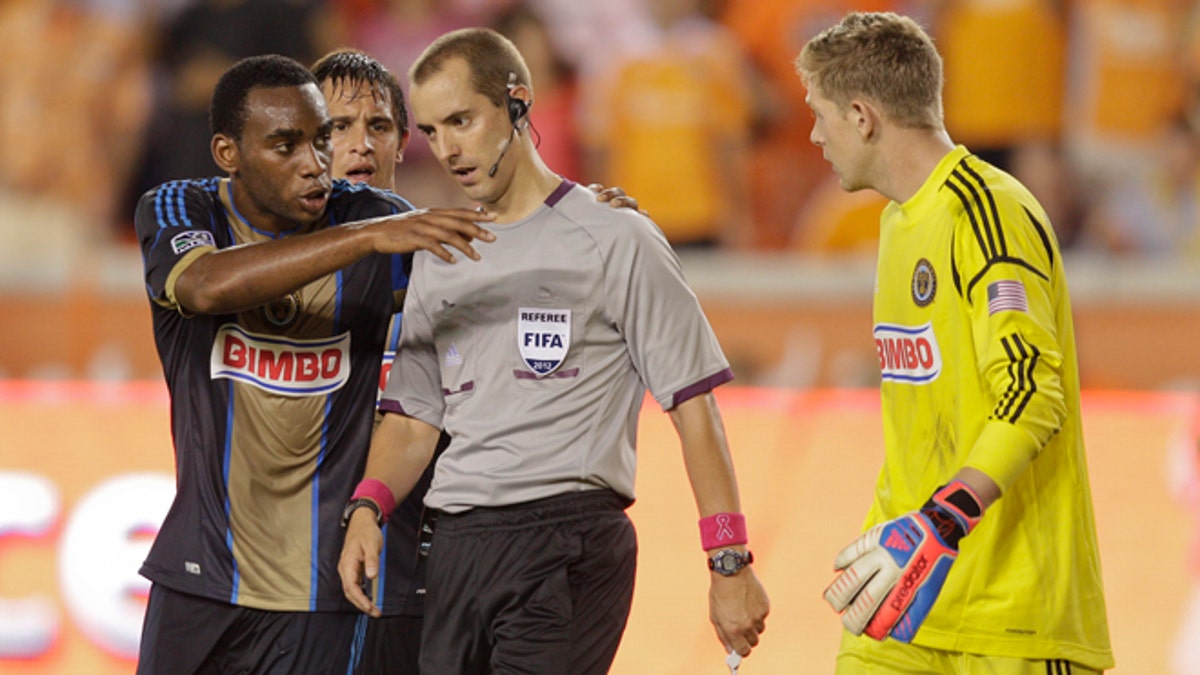
HOUSTON,TX - OCTOBER 20: Amobi Okugo #14 of the Philadelphia Union pleads with referee Mark Geiger as goalkeeper Zac MacMath #18 of the Philadelphia Union looks on after a penalty kick was given to the Houston Dynamo at BBVA Compass Stadium on October 20, 2012 in Houston, Texas. Houston won 3-1. (Photo by Bob Levey/Getty Images) (2012 Getty Images)
World Cup referees are in a similar position to the 32 teams competing in the tournament: do well and you move on to the next round, or perform poorly and head home.
Mark Geiger is the first American referee to officiate in the World Cup since 2002, and he hopes to be given better odds than the U.S. national team in Brazil.
"If you don't do well there, the tournament is done," Geiger said. "We need to focus on that first game wholeheartedly, make sure we nail that and get it right."
If he does, a big step follows.
"It's like any team, any player, any coach, you want to be in the final," Geiger said.
- Anti-World Cup Protesters In Brazil Block Roads In Sao Paulo, Snarl Traffic
- Adventurous World Cup Travelers Can Visit Ancient Amazon Ruins
- Goldman Sachs Picks Brazil To Crush Argentina In World Cup Final
- Honduras Hopes To Surprise At World Cup In Brazil With British Club Talent
- In Countdown To World Cup, U.S. Team Recalls Glorious 1950 Upset Against U.K.
- Premier League Soccer At Yankee Stadium
This is Geiger's seventh year on FIFA's list of officials approved for national team matches. The governing body has monitored him on a candidates list for two years. Midway through the process, he left his job as math teacher at Lacey Township High School in Lanoka Harbor, N.J., after 16½ years and made refereeing in Major League Soccer his full-time job.
“It was something that I had to do if I wanted to continue,” Geiger told the New York Daily News.
Geiger's commitment aligns with FIFA President Sepp Blatter's long-held wish that Cup referees be free of the distraction of a day job.
Four years ago in South Africa, World Cup final referee Howard Webb was one of few professionals, having left his career as a police officer in England. Not all the 25 doing duty in Brazil will be full-timers.
Still, Geiger had admirers at FIFA even when he was a high school teacher.
In 2011, at the Under-20 World Cup in Colombia, Geiger and his regular assistants, Sean Hurd and Canada's Joe Fletcher, were rewarded with the final.
"Up to this point it's the highlight of my career," Geiger said of Brazil's 3-2 extra-time win over Portugal, featuring three goals from playmaker Oscar, now starring for Chelsea.
FIFA took Geiger's crew to the 2012 London Olympics and the Club World Cup last December in Morocco. A few weeks later, FIFA, whose offices are in Zurich, Switzerland, selected Geiger for the World Cup.
"The email came at 2:24 a.m.," he said. "I woke up to an email and a couple of text messages from friends. An outstanding experience just to wake up and see that email."
A four-day training event this week with colleagues from Africa and South America was the last session for refs before reporting for duty June 1 in Rio de Janeiro. Officials from Europe, Asia and Oceania met in Zurich last month.
"It's a great group, a lot of humility," Geiger said.
FIFA director of refereeing Massimo Busacca urges his teams to study how the game is played.
"If we understand the team tactics and where they're going to put the ball next, we start moving in that direction and we increase our chances of having a good match," said Geiger, who watches games from across the world. "YouTube is a great tool for us."
Geiger still has time for school work, helping his brother Steven coach track and cross-country, between twice-monthly trips to Dallas for training and briefings with other MLS officials.
The spotlight is about to burn brighter, with fans and media often unforgiving of World Cup errors.
"We're reminded of how much scrutiny there is on every decision we make," Geiger said. "We need to go in there with the confidence and the physical ability to be in the right place, at the right angle to see the play properly and then have the confidence to make that decision."
Based on reporting by The Associated Press.
Follow us on twitter.com/foxnewslatino
Like us at facebook.com/foxnewslatino








































